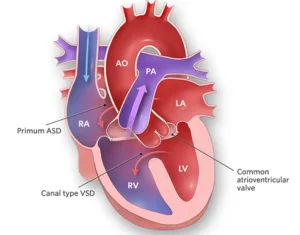Overview
Diagnosis
Atrioventricular (AV) canal defect may be detected before birth through a pregnancy ultrasound or specialized fetal heart imaging.
After birth, symptoms of a complete AV canal defect are often noticeable within the first few weeks. When listening to a baby’s heart, a healthcare provider may hear a heart murmur, a whooshing sound caused by abnormal blood flow.
Tests to Diagnose Atrioventricular Canal Defect
Pulse oximetry
A sensor placed on the fingertip measures the oxygen level in the blood. Low oxygen may indicate a heart or lung problem.
Electrocardiogram (ECG or EKG)
This noninvasive test records the heart’s electrical activity. Sticky patches with sensors are attached to the chest, and wires connect them to a computer that displays results.
Echocardiogram
Sound waves create detailed images of the heart in motion. This test can reveal holes in the heart, valve issues, and blood flow patterns.
Chest X-ray
Shows the condition of the heart and lungs. It can detect an enlarged heart or fluid in the lungs, which may indicate heart failure.
Cardiac catheterization
A thin, flexible catheter is inserted through a blood vessel in the groin and guided to the heart. A dye is injected to highlight heart structures on X-rays. This test also measures pressure in different heart chambers.
Treatment
Surgery is required to repair complete or partial AV canal defects. Multiple surgeries may be necessary depending on the complexity of the defect.
-
Complete AV canal defect
Surgeons separate the large single valve between the upper and lower heart chambers into two valves. If repair is not possible, the mitral and tricuspid valves may need replacement. -
Partial AV canal defect
Surgery focuses on repairing the mitral valve to ensure proper closure. If repair isn’t feasible, the valve may be replaced. -
Patch repair
One or two patches close the hole in the heart wall. These patches become part of the heart as tissue grows over them.
Many patients do not need additional surgery after successful repair, but complications such as heart valve leaks may require treatment.
Follow-Up Care
After surgery, lifelong follow-up with a cardiologist is essential. Adults who had congenital heart defect surgery in childhood may need care from an adult congenital cardiologist. Special monitoring may be required before future surgical procedures, even if unrelated to the heart.
Preventive Antibiotics
Some patients may require preventive antibiotics to reduce the risk of infective endocarditis (infection of the heart lining or valves), especially before certain dental or surgical procedures if they:
-
Have residual heart problems after surgery
-
Have received an artificial heart valve
-
Have prosthetic material from heart repair
Always consult your healthcare provider to determine if preventive antibiotics are necessary.
Advertisement

